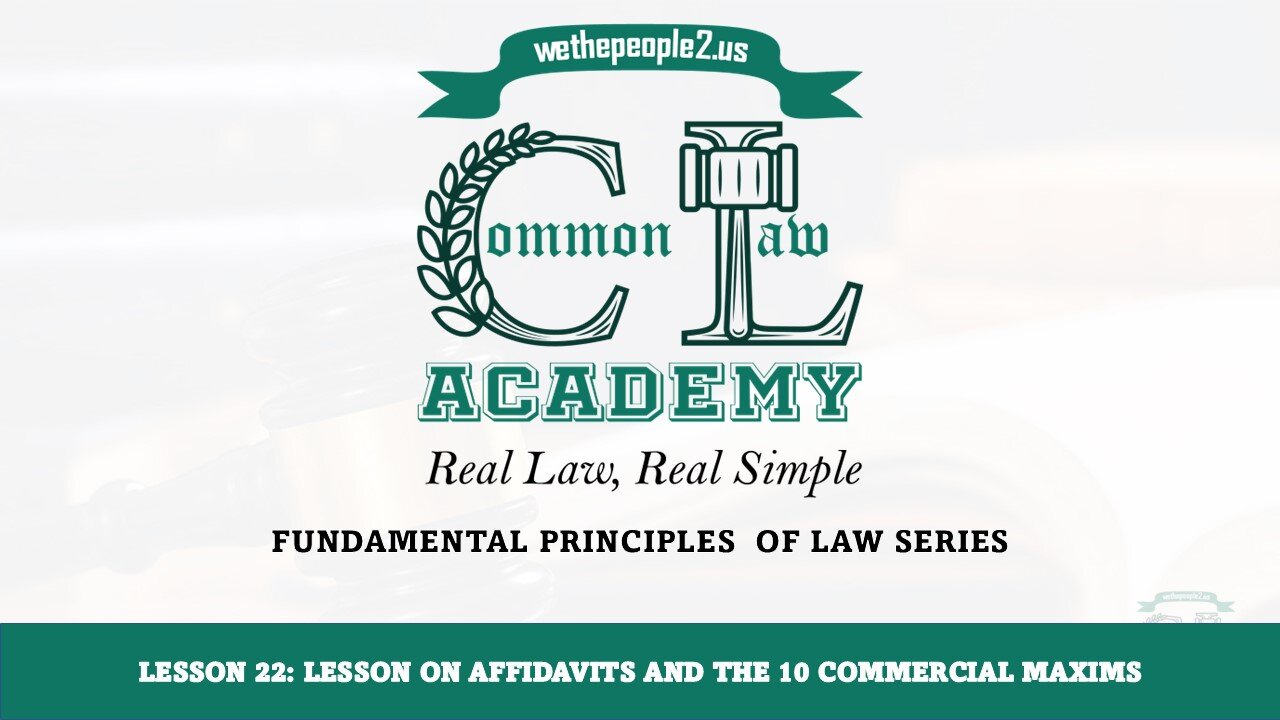Premium Only Content

Lesson 22: Lesson On Affidavits And The 10 Commercial Maxims
This lesson will focus on the powerful role of affidavits in legal proceedings and their relation to the 10 Commercial Maxims, which are foundational principles in both law and commerce. Students will learn how affidavits serve as a sworn statement of fact that holds significant weight in judicial processes, as illustrated by cases like Sampson v. Channell. We will explore the maxim "An affidavit is a court," highlighting the authority of affidavits as truth unless specifically rebutted.
Key to the discussion will be the 10 Commercial Maxims, which serve as the framework for understanding the binding nature of unrebutted affidavits in legal matters. These maxims, such as "A workman is worthy of his hire" and "Truth is expressed by means of an affidavit," guide how disputes, particularly in commerce, are resolved through fairness, truth, and accountability.
Additionally, we will review the affidavit submitted against Governor Maura Healey. This document asserts her constitutional violations, misuse of emergency powers, and the resulting consequences of maladministration. By examining this affidavit, students will understand how the principles discussed apply in real-world legal scenarios and reinforce the significance of affidavits as legal tools. The lesson will also cover how the government's response (or lack thereof) to affidavits can be binding in court, as the unrebutted affidavit stands as judgment.
Through this lesson, students will gain insight into the power of truth expressed through affidavits, the consequences of failing to rebut them, and the importance of adhering to the foundational principles of law in governance and commerce.
-
 1:55:23
1:55:23
Wethepeople2.us
4 months agoJack and Margy Flynn Constitutional Methods Training
1.26K5 -
 3:41:05
3:41:05
Sacred Sage
9 hours ago $4.16 earnedDaz3D: Attempting to Finish Zoe Conversation!
44.1K5 -
![[Stream #19 ] Gaming, Chatting, you know the drill!](https://1a-1791.com/video/s8/1/9/o/E/e/9oEeu.0kob-small-Stream-Sour-Pickle-100-Foll.jpg) LIVE
LIVE
OneRandomDolly
7 hours ago[Stream #19 ] Gaming, Chatting, you know the drill!
205 watching -
 11:07
11:07
TimcastIRL
1 day agoElon Musk Suggests He’ll BUY MSNBC, Joe Rogan Will REPLACE Rachel Maddow
79.7K65 -
 34:24
34:24
The Rubin Report
1 day agoFormer CEO: The Aftermath of Vice Media & What's Next for Mainstream Media | Shane Smith
93.9K40 -
 9:14:23
9:14:23
tacetmort3m
2 days ago🔴 LIVE - BECOMING THE UNTOUCHABLE (RADIATION WHO?) - STALKER 2 - PART 3
39.7K6 -
 16:05
16:05
China Uncensored
21 hours agoAnother Car-Ramming Strikes Outside a Chinese School!
30.3K13 -
 9:26
9:26
Dr. Nick Zyrowski
12 hours agoAnti Inflammatory Foods | You MUST Eat These!
23K6 -
 15:40
15:40
Bearing
8 hours agoEnd Stage Trump Derangement | Rosie O'Donnell is NOT Doing Well 😬
24.5K114 -
 35:19
35:19
hickok45
11 hours agoSunday Shoot-a-Round # 256
29.2K31